In the complex healthcare environment, practices handle a mountain of data daily, encompassing patient records, treatment outcomes, billing information, and much more. However, despite the vast data at their disposal, many practices lack the proper tools or in-house resources to delve deep into this data to extract valuable insights. This is where a business intelligence analyst becomes indispensable. These professionals can transform raw data into actionable insights, helping practices thrive in today’s competitive healthcare landscape.
What Is a Business Intelligence Analyst?
Business intelligence analysts analyze complex data sets to help a business improve its decision-making processes. In healthcare, analysts focus on interpreting patient care, billing, claims, and operational efficiency data. They utilize advanced analytics tools and software to provide practices with data-driven insights that support better business decisions.
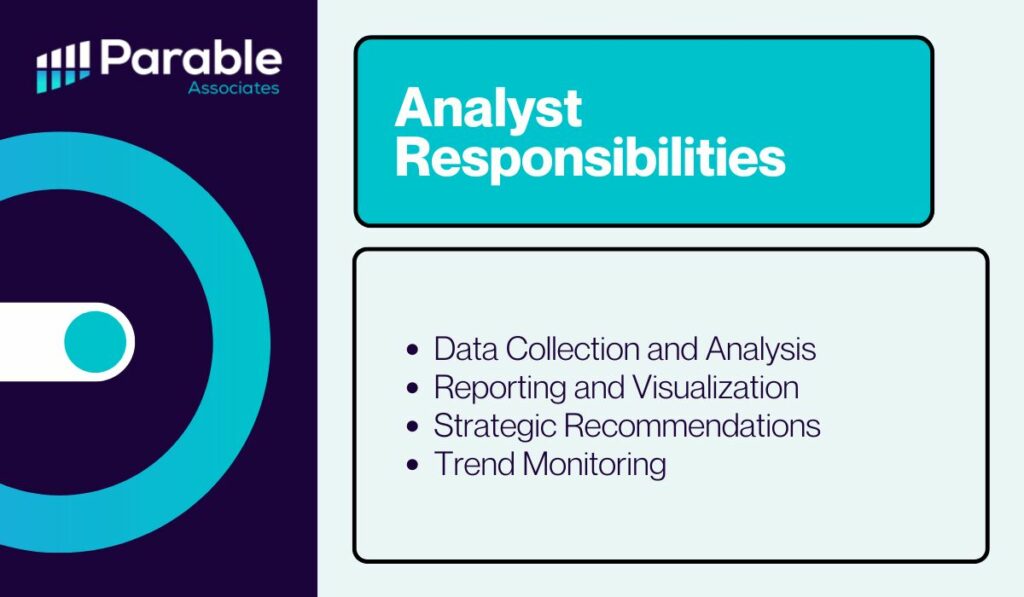
What Does a Business Intelligence Analyst Do?
The core responsibilities of a business intelligence analyst in healthcare include:
Data Collection and Analysis: Collecting data from various sources, including EHRs, patient feedback, and operational metrics, and then analyzing this data to identify trends and patterns.
Reporting and Visualization: Creating reports and visual dashboards that make it easy for practice managers and clinicians to understand complex data at a glance.
Strategic Recommendations: Providing actionable recommendations based on data analysis to help practices enhance efficiency, improve patient outcomes, and increase profitability.
Trend Monitoring: Keeping track of healthcare trends and regulatory changes to advise practices on potential impacts or opportunities.
With the amount of data amassed daily in the modern healthcare environment, working with a business intelligence analyst can transform your practice. By harnessing the power of data, analysts can identify inefficiencies, optimize operations, and significantly enhance both financial and operational performance. The following are the benefits business intelligence analysts can provide, enabling you to take your practice to new heights.
Reducing Claim Denials
One critical area where business intelligence analysts prove invaluable is reducing claim denials. By analyzing the trends and root causes of past denials, analysts can pinpoint specific issues, whether related to coding errors, inadequate documentation, or failure to meet payer requirements. With this information, practices can implement targeted interventions to reduce denials and improve cash flow.
Claim denials occur when an insurance payer refuses to pay for healthcare services provided and billed, citing various reasons. These denials can be broadly classified into two categories: clinical denials and technical denials.
Clinical Denials
Clinical denials happen when a claim is denied because the service or procedure provided was deemed not medically necessary or was not following the payer’s clinical guidelines. Such determinations are usually made by a medical professional, like a physician or nurse reviewer. They can be based on the type of treatment, test, medication and dosage, or length of treatment.
Technical Denials
Technical denials, on the other hand, occur due to non-clinical factors such as errors in the claim submission process or missing or incorrect information on the claim. These could include incorrect patient details, late submissions, or the need for pre-authorization. Technical denials are often identified by automated systems that check for errors or omissions.
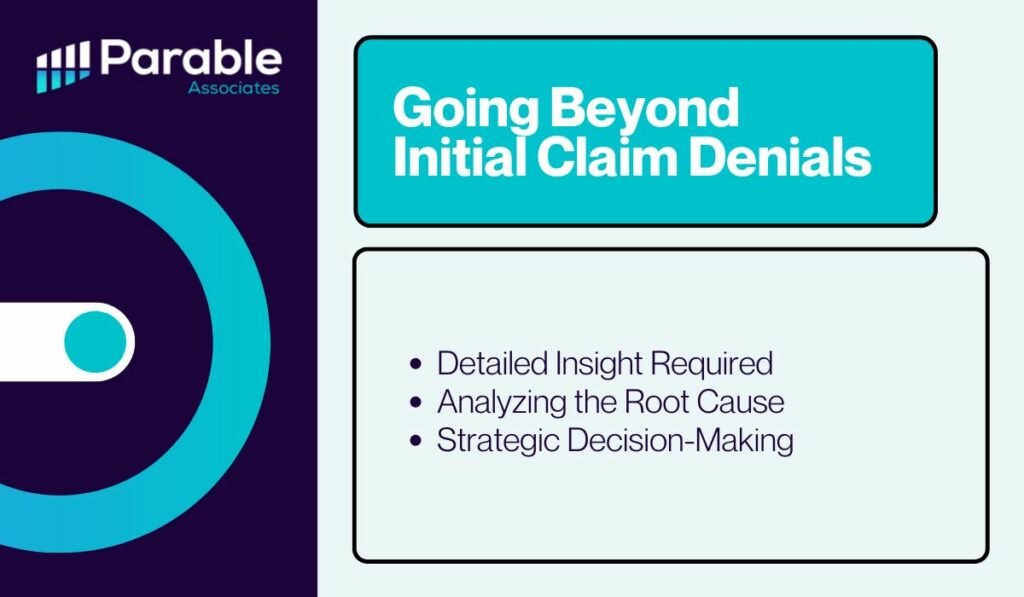
The Limitation of Initial Denial Notices
When practices receive a denial, it often comes in standardized formats like the 835 remittance advice, which provides essential information on payments and denials. These documents specify why a claim was paid differently than billed, including Claim Adjustment Reason Codes (CARCs) and Remittance Advice Remark Codes (RARCs).
However, merely receiving an 835 with a denial code does not provide enough context to manage and address the denial effectively. Here’s why:
Detailed Insight Required: Practices need comprehensive data to understand the full scope of the denial. This includes knowing the total charges initially billed, any adjustments made to the account, and all payments received to date. This information is crucial to determine what percentage of the charges were paid by the payer and how much is contractual.
Analyzing the Root Cause: Understanding the specific reasons for denials, beyond just the code, helps identify systemic issues or recurring errors that can be corrected to prevent future denials.
Strategic Decision-Making:
With detailed information, practices can decide whether to write off a denial or pursue an appeal. This decision-making process requires a thorough analysis of the context of the denial, not just that it was denied.
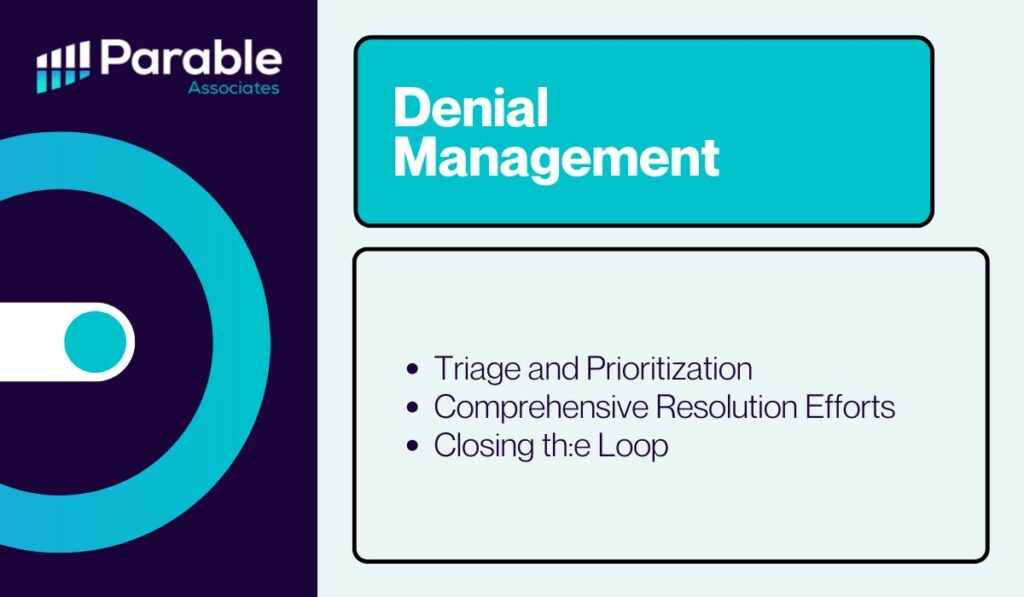
Navigating the Denial Management Process
To effectively manage denials and reduce their impact on the revenue cycle, practices must go beyond the initial denial information and dig deeper into the specifics of each case. This involves setting up a denial management system that categorizes and routes denials to the appropriate staff for either clinical or technical resolution.
Triage and Prioritization: Each denial must be evaluated and triaged based on its reason code and the specifics of the patient’s case. This helps prioritize which denials to address first based on their impact and the likelihood of successful overturn.
Comprehensive Resolution Efforts: Efforts to overturn a denial can include a detailed review of the patient’s medical records, correspondence with the insurance company, and possibly resubmitting the claim with additional documentation or corrected information.
Closing th:e Loop Successfully resolved denials are closed with either a payment or an adjustment transaction. Unresolved denials, however, continue to age and negatively impact the practice’s accounts receivable.
The Need for Expertise
Effectively managing and mitigating claim denials requires access to detailed data and the expertise to interpret and act on that data. Business intelligence analysts play a crucial role in this process by providing the insights needed to improve claim approval rates, enhance revenue cycle efficiency, and reduce financial losses due to denials. By leveraging detailed analytical processes and data-driven strategies, these analysts help healthcare practices navigate the complexities of claim denials and secure their financial health.
Improving Accounts Receivable (AR)
Effective accounts receivable management is crucial for any healthcare practice’s financial health. Business intelligence analysts help by identifying patterns and anomalies in AR data, such as unusually long billing cycles or high rates of unpaid claims. They develop strategies to enhance billing processes, speed up claim reimbursement, and reduce the age of AR, ultimately improving the practice’s revenue cycle efficiency.
An aged trial balance (ATB) is a common financial report used in healthcare practices to list all unpaid patient bills, categorized by the length of time the bill has been outstanding. While this report is useful for a snapshot of account statuses and to monitor the health of accounts receivable, it often needs to catch up when it comes to providing the in-depth data needed for comprehensive analysis and strategic decision-making.
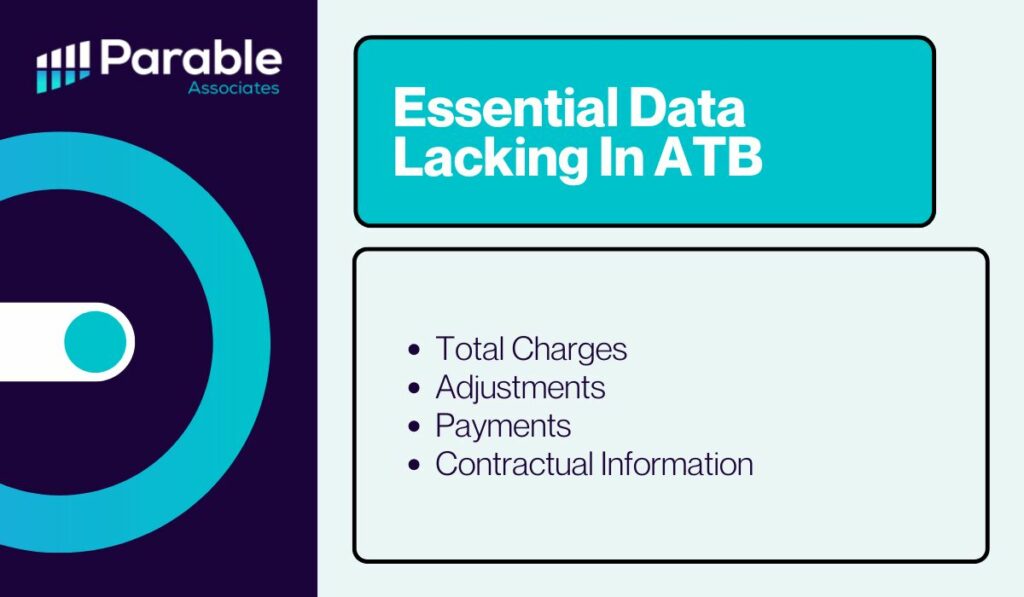
Why ATB Alone Isn’t Sufficient
The fundamental limitation of an ATB is its focus on account balances without contextual details. It does not typically include essential data points that are critical for more in-depth analysis:
Total Charges: Understanding the total charges billed to the account is crucial. Analysts need to see the full scope of what was originally charged to evaluate how much has been paid off and how much is still outstanding.
Adjustments: These include any write-offs, discounts, or charge corrections applied to an account. Adjustments can significantly affect the outstanding balance and provide insights into billing accuracy and the frequency of billing issues.
Payments: Detailed information about payments already made by payers is essential. It’s not enough to see what’s left; knowing what portion of the charges the payer has covered can indicate the effectiveness of billing practices and the reliability of payer reimbursements.
Contractual Information: The terms agreed upon with payers often include contractual adjustments where certain percentages of charges are agreed to be paid. Knowing the percentage of charges paid versus what was contractually agreed upon allows analysts to assess payer compliance and the accuracy of contract management processes.
Without these details, an ATB provides a surface-level view that might miss underlying problems or opportunities for improvement. For example, a consistently high balance might not be due to slow-paying patients but could be a sign of systemic issues with how charges are entered, how payments are processed, or how adjustments are handled.
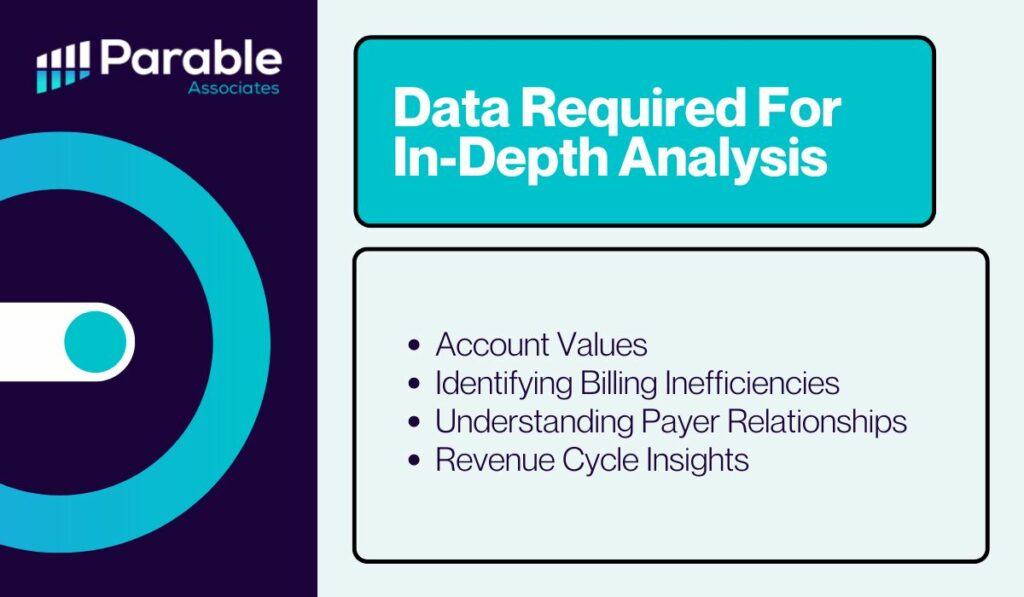
Comprehensive Data for In-depth Analysis
For business intelligence analysts, having access to a detailed breakdown of every account goes beyond simple balance tracking. It involves analyzing the full lifecycle of each account to identify trends, pinpoint inefficiencies, and suggest actionable improvements. This kind of detailed analysis is crucial for:
Valuing Accounts: Analysts can assess the true value of each account based on how much revenue is actually recoverable after accounting for adjustments and payments.
Identifying Billing Inefficiencies: Detailed transaction histories allow analysts to identify common errors or inconsistencies in billing, which can then be rectified to improve the accuracy of future billing.
Optimizing Payer Relationships: By understanding the payment behaviors of different payers, practices can negotiate better terms, address compliance issues, and streamline the billing process for improved efficiency.
Enhancing Revenue Cycle Management: With a complete view of charges, adjustments, and payments, practices can refine their revenue cycle management strategies to reduce days in accounts receivable and improve overall financial health.
While an ATB can be useful for monitoring accounts receivable, it does not provide the rich, contextual data needed by business intelligence analysts to drive meaningful improvements. Practices that want to truly optimize their operations and financial outcomes need to ensure their analysts have access to comprehensive, detailed data that goes beyond what an ATB can offer.
Increasing Operational Efficiency
Operational efficiency in healthcare is key to smooth operations, enhanced patient experience, and reduced costs. It encompasses many activities, including patient scheduling, staff allocation, and inventory management. The expertise of business intelligence analysts can help practices identify bottlenecks and inefficiencies that could be holding back operational effectiveness.
Patient Scheduling
Efficient patient scheduling is fundamental in optimizing patient flow and resource utilization in healthcare settings. Analysts can utilize data to identify patterns in appointment bookings and no-show rates, which can inform more effective scheduling strategies. For instance, by analyzing peak times for patient visits and no-show trends, analysts can recommend scheduling adjustments that maximize the utilization of healthcare providers’ time while minimizing patient waiting times.
Staff Allocation
Staffing is another critical aspect where data analysis can drive significant improvements. Business intelligence analysts assess data related to staff performance, patient care needs, and peak operation times to optimize the allocation of human resources. By aligning staff schedules with patient flow patterns, healthcare practices can ensure they have the necessary personnel available at the right times without underutilizing or overburdening their staff. This not only improves service delivery but also enhances staff satisfaction and retention.
Inventory Management
Efficient inventory management is essential to ensure the availability of necessary medical supplies without resorting to excessive stockpiling, which ties up capital. Analysts can help streamline inventory processes by analyzing usage rates and supply lifecycles to create more accurate forecasting models. Recommendations include adjusting order quantities, setting up automated reordering systems based on predictive analytics, or identifying alternative suppliers to reduce costs and improve supply chain reliability.
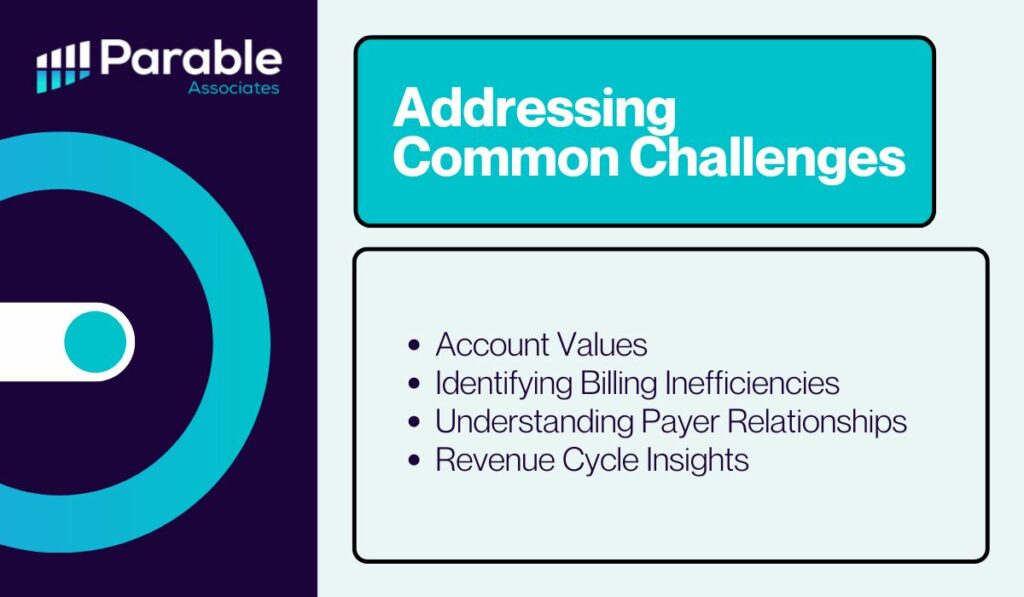
Addressing Common Challenges
Operational inefficiencies often stem from outdated practices, siloed data, and a need for integrated systems. Business intelligence analysts address these issues by:
Integrating Data Systems: By ensuring that different operational systems (like scheduling software, HR systems, and inventory management tools) communicate effectively, provides a unified view of operations that allows for more cohesive management.
Implementing Advanced Analytics: Using predictive analytics and machine learning models to anticipate future operational challenges and needs allows for the proactive management of resources.
Training and Adoption: Helping staff adapt to new tools and processes that arise from operational changes is crucial for the successful adoption of more efficient practices.
Increasing operational efficiency in healthcare not only reduces costs but also significantly enhances the quality of patient care and staff morale. Business intelligence analysts are at the forefront of this transformation, leveraging data to pinpoint inefficiencies and recommend actionable solutions. Their work ensures that healthcare practices can deliver superior care efficiently and sustainably, setting a foundation for continuous improvement and innovation in healthcare operations.

Partnering with Parable Associates
Parable Associates specializes in healthcare analytics. Whether your practice is already using business intelligence software like ModMed, Experity, or WebPT and not seeing the desired outcomes, or just getting started with healthcare analytics, we can guide you to success.
Our analysts can integrate all pertinent data into a single, customized dashboard designed specifically for your practice. This enables you to make informed decisions quickly and effectively, ensuring that your practice not only meets but exceeds its operational and financial goals.
Don’t let the complexities of data overwhelm your practice. With the expertise of a business intelligence analyst from Parable Associates, you can unlock the full potential of your data to drive improvement and growth. Contact us to learn how we can tailor our services to your needs and help you transform the financial and operational health of your practice. Harness the power of your data and start making smarter decisions for your practice.
Business Intelligence Analysts FAQs
A business intelligence analyst is a professional who analyzes complex data sets to help improve business decision-making. In healthcare, they focus on patient care, billing, claims, and operational efficiency data.
They gather and analyze data from various sources, create visual reports and dashboards, provide strategic recommendations, and monitor healthcare trends to help practices make informed decisions.
Analysts identify trends and root causes of past claim denials, enabling practices to address specific issues such as coding errors or inadequate documentation to reduce future denials and improve cash flow.
Analysts help identify patterns and anomalies in AR data, enhance billing processes, speed up claim reimbursement, and reduce the age of AR, improving the revenue cycle efficiency of a practice.
Yes, by analyzing data related to patient scheduling, staff allocation, and inventory management, they can identify inefficiencies and recommend changes that improve overall operational effectiveness.
An ATB typically focuses only on account balances without providing detailed insights such as total charges, adjustments, and payments, which are crucial for comprehensive financial analysis and decision-making.
Parable Associates specializes in integrating all relevant data into a customized dashboard designed specifically for your practice, helping you make informed decisions quickly and effectively to optimize both financial and operational performance.

